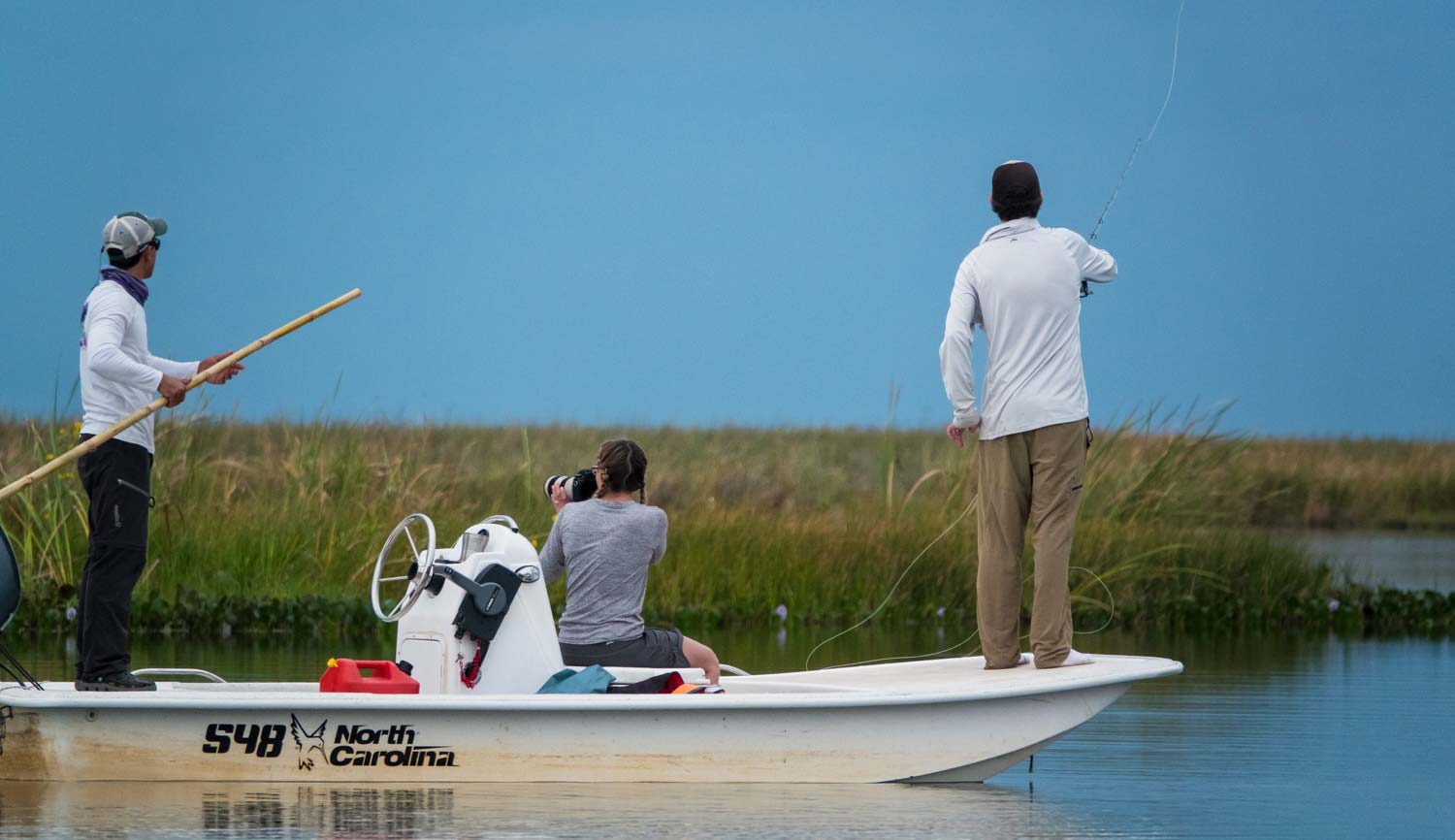
Johnny and Hilary Spillane enjoying the Ibera Wetlands. Photo by Louis Cahill
By Louis Cahill
Every now and then I have to remind myself that a redfish tail isn’t going to pop up along the edge of the grass.
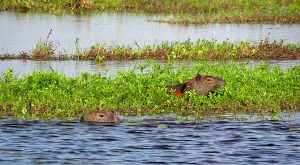 The scene looks familiar but what lurks below the surface is a bit more sinister. The Ibera Wetlands, in northern Argentina, may look like the Lowcountry marsh of South Carolina but that’s the end of any similarity. The eight-thousand square mile, freshwater marsh is like a vast, grassy inland sea. It filters immeasurable gallons of rainwater headed for the Parana river system and supports a remarkably diverse array of wildlife including prehistoric tapers, capybara, caiman and countless exotic birds. Deep in the marsh live native people so isolated they do not even speak Spanish, and while everything that meets your eye appears like some lost paradise, below the surface of the water things are very different. There in the weed and grass below the water is the most ruthless food chain I have ever witnessed.
The scene looks familiar but what lurks below the surface is a bit more sinister. The Ibera Wetlands, in northern Argentina, may look like the Lowcountry marsh of South Carolina but that’s the end of any similarity. The eight-thousand square mile, freshwater marsh is like a vast, grassy inland sea. It filters immeasurable gallons of rainwater headed for the Parana river system and supports a remarkably diverse array of wildlife including prehistoric tapers, capybara, caiman and countless exotic birds. Deep in the marsh live native people so isolated they do not even speak Spanish, and while everything that meets your eye appears like some lost paradise, below the surface of the water things are very different. There in the weed and grass below the water is the most ruthless food chain I have ever witnessed.
We are there to fish for dorado, the king of freshwater sport fish.
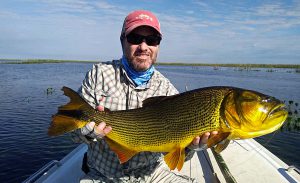 They are a vicious apex predator and seriously challenging on a fly rod, but they are only one of a cast of toothy players in this place. I honestly can’t remember the names of most of the species I’ve caught. The first morning, eight casts brought in eight different species, including one that looked like a musky and a neon tetra had a baby. There are piranha everywhere. Growing up in the sixties, television led me to believe two thing were going to be a constant threat in life, quicksand and piranha. I’ve still yet to have a life threatening run in with quicksand but, in this place, piranha live up to my childhood expectations. I wasn’t eaten alive, but I lost countless flies. Some spots you just have to fire up the motor and move on.
They are a vicious apex predator and seriously challenging on a fly rod, but they are only one of a cast of toothy players in this place. I honestly can’t remember the names of most of the species I’ve caught. The first morning, eight casts brought in eight different species, including one that looked like a musky and a neon tetra had a baby. There are piranha everywhere. Growing up in the sixties, television led me to believe two thing were going to be a constant threat in life, quicksand and piranha. I’ve still yet to have a life threatening run in with quicksand but, in this place, piranha live up to my childhood expectations. I wasn’t eaten alive, but I lost countless flies. Some spots you just have to fire up the motor and move on.
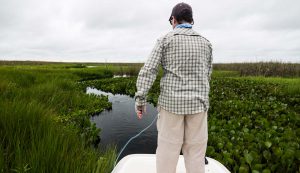 Moving on is, in it’s self an interesting proposition in the wetlands. The abundance of vegetation gives the impression that there is a lot of land. There isn’t, just huge rafts of floating vegetation. What look like islands move with the flow of the water. If you open a channel through them, it will quickly close. While making navigation tricky, the narrow slips through the vegetation make for some very cool fishing. We pole the boat down channels barely four feet wide, casting huge rat patterns into bends and cuts ahead of the boat. When a strike comes, it’s heart stopping.
Moving on is, in it’s self an interesting proposition in the wetlands. The abundance of vegetation gives the impression that there is a lot of land. There isn’t, just huge rafts of floating vegetation. What look like islands move with the flow of the water. If you open a channel through them, it will quickly close. While making navigation tricky, the narrow slips through the vegetation make for some very cool fishing. We pole the boat down channels barely four feet wide, casting huge rat patterns into bends and cuts ahead of the boat. When a strike comes, it’s heart stopping.
Dorado fishing is never easy. No matter where you do it, or how, it will test you.
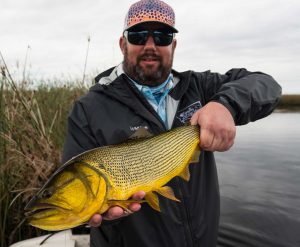 You will certainly have some great fishing days in the wetlands but you will have tough ones too. Dorado are smart, wary and unforgiving. When you catch one, there’s nothing that really compares. The wetlands fish, at least, have not seen any real angling pressure. On the roughly half of the wetlands where we fish, only six anglers per day are permitted. That certainly raises the odds. There are big dorado here, but the average fish we catch is three to fifteen pounds. Of course, in the narrow channels a five pound dorado is a handful. I’ve caught huge dorado on the Parana but fishing these wetland fish on the surface is a new thrill and very unique. The fish themselves are very unusual. Dark green, and even black backs set off the blazing gold flanks and orange tails. They are as beautiful and exotic as aquarium fish.
You will certainly have some great fishing days in the wetlands but you will have tough ones too. Dorado are smart, wary and unforgiving. When you catch one, there’s nothing that really compares. The wetlands fish, at least, have not seen any real angling pressure. On the roughly half of the wetlands where we fish, only six anglers per day are permitted. That certainly raises the odds. There are big dorado here, but the average fish we catch is three to fifteen pounds. Of course, in the narrow channels a five pound dorado is a handful. I’ve caught huge dorado on the Parana but fishing these wetland fish on the surface is a new thrill and very unique. The fish themselves are very unusual. Dark green, and even black backs set off the blazing gold flanks and orange tails. They are as beautiful and exotic as aquarium fish.
We stay in the town of Concepcion. Pronounced like the great Cincinnati Reds shortstop Dave Concepcion. Lucas Mora tries to explain the name to us.
“It means, you know, when a woman is going to have a baby…”
 We laugh, and let him know that we all know what it means, and we assume that the Concepcion referred to is immaculate. It is the second oldest city in Argentina. A tiny place with dirt streets. Rather than no parking signs, there are notices against the tying of horses. Every home has it’s own chapel and many have shrines to Gaucho Gil, an argentine folk hero very similar in his mode of operation to Robin Hood. Bright red flags adorn the shrines, which house likenesses of Gaucho Gil and his horse. Our hotel is a beautiful hacienda from the early eighteen hundreds. It is ancient but shines like a new penny. There is a big interior courtyard where we spend our evenings eating and drinking near a fire. In the corner is an open air chapel, incase you feel the need to pray for a dorado.
We laugh, and let him know that we all know what it means, and we assume that the Concepcion referred to is immaculate. It is the second oldest city in Argentina. A tiny place with dirt streets. Rather than no parking signs, there are notices against the tying of horses. Every home has it’s own chapel and many have shrines to Gaucho Gil, an argentine folk hero very similar in his mode of operation to Robin Hood. Bright red flags adorn the shrines, which house likenesses of Gaucho Gil and his horse. Our hotel is a beautiful hacienda from the early eighteen hundreds. It is ancient but shines like a new penny. There is a big interior courtyard where we spend our evenings eating and drinking near a fire. In the corner is an open air chapel, incase you feel the need to pray for a dorado.
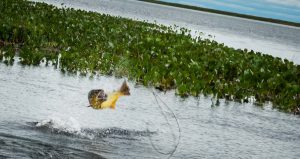 I am sad when it’s time to leave this place, it’s beautiful scenery, it’s exotic wildlife and it’s warm hearted people. I will miss the dirt streets, the free range chickens, the friendly street dogs and the horses. I’ll miss the hospitality of the gauchos and trappers who live in the marsh, there warm smiles and their native speech. Mostly I’ll miss the vast wilderness of the wetlands, the amazing fishing and the solitude. It’s a pretty rare thing these days to see a place that’s truly wild and untouched. It will be a year before I see this place again, but it will be in my heart every day.
I am sad when it’s time to leave this place, it’s beautiful scenery, it’s exotic wildlife and it’s warm hearted people. I will miss the dirt streets, the free range chickens, the friendly street dogs and the horses. I’ll miss the hospitality of the gauchos and trappers who live in the marsh, there warm smiles and their native speech. Mostly I’ll miss the vast wilderness of the wetlands, the amazing fishing and the solitude. It’s a pretty rare thing these days to see a place that’s truly wild and untouched. It will be a year before I see this place again, but it will be in my heart every day.

Can you provide a link to the place you stayed and went fishing with so others can take a look at the opportunities?
Thanks,
William
The guys at Parana on the fly are awesome. http://paranaonthefly.com/
I’ll be hosting a trip next year. Join us! Email me at hookups@ginkandgasoline.com
“including one that looked like a musky and a neon tetra had a baby.”
Made me laugh out loud. Sounds like one he’ll of a trip!